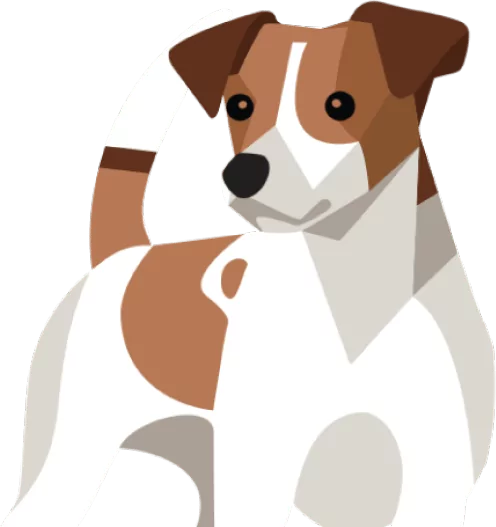Dog Safety Guide, by Dr Louisa Graham
Dr Louisa Graham, a prominent veterinary surgeon specialising in Small Animal Medicine, has partnered with premium dog food brand Laughing Dog to support pet owners on every element of caring for their dogs during nationwide lockdown.
Having created ten top tips on every element of petcare, Louisa shares her advice on everything from diet and exercise to downtime and play, in order to support pet parents during this time…
1. Keep walking consistent
Current government guidelines allows for one form of outside exercise per day, which includes walking your dog. Of course, it is vital to avoiding busy areas and maintain social distance of 2 metres, and this goes for your dog too.
It’s necessary to walk your dog and get them out of the house in that one exercise slot. The distance you can walk your dog will vary on your dog’s breed, age and underlying health. I try and alternate lead-work with off-lead to allow my dogs to explore and gain a sense of direction, and definitely vary the routes as much as possible to keep them interested and alert.
2. Interactive feeding
Not only does this keep your dog’s mind stimulated but it harnesses their natural desire to hunt and work for their food. There are a variety of interactive feeders that can be bought online, or you can make them yourself! Try putting holes in leftover plastic bottles (make sure the edges are not sharp), milk cartons or even a cereal box, fill them with their kibble and encourage your dog to figure out how to get the food out. If your dog likes tennis balls, then get a cake tin (or even an empty toolbox) and fill some of the compartments with treats. Put the tennis balls back on top and let them sniff out the treats by removing the balls!
3. Encourage play
When dogs are bored or lonely, they will create their own games which may lead to inappropriate and destructive behaviour. Why not make an assault course to keep your dog occupied? This is where you can be creative. Use chairs to walk around/on, and towels/mops/pillows/rugs to walk over. If you have spare soil or bark for your garden, you could create a digging area and hide toys or treats in there for some supervised digging. If you don’t have outside space, I would also recommend getting creative by putting cardboard boxes together, cutting holes in them to make-shift your own maze and tunnels.
“Nose games are mentally stimulating and a great way to let your dog explore their natural sniffing abilities”
4. Get that nose working!
Nose games are mentally stimulating and a great way to let your dog explore their natural sniffing abilities. Show your dog a treat and throw it, encouraging them to ‘fetch it/find it’. Then in time you can start hiding treats/toys around the garden or house encouraging them in the right direction where needed. If you’ve got a yoga matt you can roll kibble inside it and let them sniff and push the matt open to reveal the food. I love snuffle mats for interactive feeding particularly for older pets; your garden can act as a natural snuffle matt or you can DIY and make one! Filling cardboard boxes with shredded up newspaper and hiding small food items such as Laughing Dog’s dental, joint or white fish treats in there makes a fun interactive sniffing and feeding game too. I use these treats as they benefit my dogs’ diets at certain points throughout the day, such as Chamomile ingredients in the Night treats to help them get a good night’s sleep.
5. Old dogs, new tricks!
Stimulate your dog’s mind by teaching new tricks. Sit, stay, wait, heal, weave, beg, pray. You name it! Reward them with something tasty, with praise or a toy if they’re not motivated by food. I normally recommend high value treats for a reward, particularly with puppies, but this depends what your dog can tolerate, their current diet and their weight. If your pet likes a healthy reward then you try small bits of carrots, banana, courgettes or apples. Don’t forget you can and should teach old dogs’ new tricks! There are is lots of online resources and YouTube channels on how to train, but the key is to keep it simple, be repetitive, and reward them for trying.
“Dogs need to feel comfortable being alone in order to prevent behavioural issues such as separation anxiety when our daily routines change again by returning to work”
6. Factor in some down time
At a time when we are home the most, we must still encourage our dogs to have a ‘timeout’ on their own. This is where chews or toys can be useful to associate alone time with something positive and exciting. Dogs need to feel comfortable being alone in order to prevent behavioural issues such as separation anxiety when our daily routines change again by returning to work.
You can fill chews with all sorts and even freeze food inside them to act as a lollipop. Peanut butter (please make its xylitol free) is great as it’s sticky and dogs will lick this for ages. Why not think of other things to put inside chews to freeze. Could you make a doggy broth to fill and freeze inside a chew or even make ice cubes for some frozen entertainment (such as frozen natural yoghurt)? Just be mindful puppies/older dogs may not be able to have the same chew as a healthy adult and there is the potential for upset tummies and excess calories! I personally only recommend chews that you can bend to prevent unnecessary tooth damage (sorry – no bones or antlers for me) and those that are lower in calories! Some dogs love broccoli stems and carrots as chews! My advice is to give one of their favourite toy/treat with downtime so they look forward to it!
7. Puppies
If you have a puppy that cannot be vaccinated and socialised outdoors yet, please don’t worry. You can still expose them to the outdoor noises and smells by carrying them on your walks and holding them whilst they watch other dogs walk by, as positively reinforcing calm behaviour is vital, and rough play between dogs can be detrimental. Why not utilise your (stationary) car by getting them to sit in the boot? You could even turn the windscreen wipers on and play the radio, or expose them to as many sounds as possible in the house – or consider downloading the Soundproof Puppy Training App or the Dogs Trust Sound Therapy for pets. If you fancy a laugh you could consider dressing up… as hilarious as it sounds, disguising yourself and letting your puppy approach this unfamiliar person will do wonders for socialisation and confidence.
“50% of our pets in the UK are unfortunately overweight…”
8. Portion control and feeding
50% of our pets in the UK are unfortunately overweight, which brings an abundance of health issues. Let’s not escalate this with unnecessary and excessive feeding whilst unable to exercise more frequently at the moment. Utilise the interactive feeding and exercise advice by trying to maintain a healthy weight for your dog; a healthy dog = a happy dog! For example, Laughing Dog Naturally 5 is a complete which I’d recommend as it supports a balanced recipe for healthy digestion, immunity, joints, bones and teeth. In times of uncertainty take advantage of food suppliers that offer a subscription service of balanced dog food. Laughing Dog, a naturally wholesome dog food brand, for example offers a monthly delivery package of your chosen dog food which enables continuity and consistency (plus – when you subscribe online via the website, you’ll receive free healthy treats for your pet too!).
9. Interaction
Just spend time with your dog! Video them and make family videos, make tailored treats for them (doggy cookbooks exist!), spend extra time grooming them, when was the last time your pup had a hair wash, which depending on your dog is also great fun for the kids, or even consider giving a doggy massage. The latter can be lovely for the older dogs with arthritis and other joint conditions.
10. Gratitude!
Finally – if you’re lucky enough to have a pet at home be grateful for the company. We know the positive impact pets have on our own wellbeing and if there is ever a time when we need their company it’s now.
Credit: Qualified vet, Dr Louisa Graham, has partnered Laughing Dog, the premium pet food brand, to offer guidance for pet parents to care for pets during the lockdown period.
Visit www.laughingdogfood.com to find out more.
For more tips and tricks from Dr Louisa Graham, check out @laughingdogfood on Instagram


